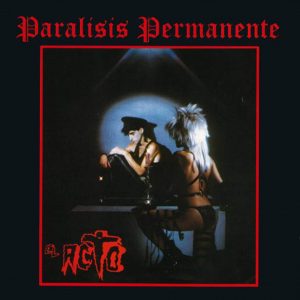The Lost and Found
Paralisis Permanente
El Acto LP—1982
The death of Dictator Francisco Franco in 1975 brought an end of decades of oppression and the birth of freedom of expression for the people of Spain. The transitional period that followed saw the counterculture run wild.
“La Movida Madrileña” (Madrilenian Scene) was an artistic movement that took place after the heavy political weight was lifted in Madrid but also expanded to neighboring cites Vigo, Barcelona and Bilbao. The counterculture erupted and Madrid was injected with a surge of creativity that was bottled up for many years—painters, architects, graffiti artist, poets, film makers and many musicians flourished in their new found freedom.
Artists of all trades were collaborating together—painters would do art work for album sleeves for the bands, and bands would be in films. Film Director Pedro Almodovar’s film Pepi, Luci, Bom Y Otras Chicas Del Monton (1980) showed how far the hedonistic freedom of this time period was going—pushing the limits of everything.
Just like Manchester in the 80s, Madrid and its progressive art and music movement was also getting recognition and acknowledged by the media. Radio and TV were heavy supporters of the buzzing music scene; shows like La Bola De Cristal (a goth-y kids TV show I’m still trying to figure out, aired from 1984 to 1988) hosted by Alaska (of la Movida favorites new-wavers Alaska y los Pegamoides) and La Edad De Oro (ran from 1983 to 1985) would talk about the significance of the movement of the post-Franco Regime as well as host many of the surging bands coming out of Madrid and several other cities of Spain.
The music scene was influenced by what was popping off in the underground; groups like the Sex Pistols, Joy Division and Siouxie from the UK, and the Ramones and New York Dolls from the US were the template for the punk, post-punk and new-wave that would make up the core sound of La Movida Madrileña—Kaka De Luxe, Alaska y Los Pegamoides, Radio Futura, Los Nikis, Nacha Pop, Los Secretos, Los Monaguillosh, Gabinete Caliari, La Mode, Decima Victima, Glutamato Ye-Ye, Aviador Dro, Los Zombies as well as and many others.
Goth legends of Madrid, Paralisis Permanente, were at the center of the Movida, credited as pioneers of the post-punk movement in Madrid and also in many of its neighboring cities.
The band’s career (from 1981 to 1983) came to a halt when lead singer Eduardo Benavente lost his short life of 20 years in a car accident while traveling with other members of the band. Their only releases (while active) were 1 single, 2 EPs and their sole LP, El Acto.
The album is balanced by fast paced punk paranoia with darker goth dreariness. “Adictos de la Lujuria” opens the album with a rainstorm (literally) properly setting the mood before going head first into a bloody pool of razor sharp guitar distortion and ghostly synths. The gloomy tones of Bauhaus and the Cure are reflected on songs like “El Acto” with its slow paced evilness and cynical lyrics.
The band also take a shot at some covers—“Quiero Ser Tu Perro” (The Stooge’s ‘I Wanna Be Your Dog’) and Bowie’s “Heroes” sung in Spanish with altered lyrics are given a new life and surge with frenetic anxiety.
Benavente’s doom and gloom lyrics were both strange and powerful at such a young age tackling themes of loneliness and yes, death; his voice still sounding very youthful and anxious like he was just getting started. After Paralisis Permanente and rest of the Movida took charge of the artistic front, the flood gates were open. Frozen in time are the images and sounds of one the great artist of the Movida Madrileña.




